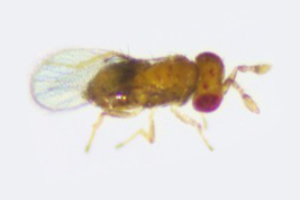William Nusillard PhD thesis
 Evolution of the performance of biological control programmes in vineyards using Trichogramma in the face of the combined effects of pesticides and global warming
Evolution of the performance of biological control programmes in vineyards using Trichogramma in the face of the combined effects of pesticides and global warming
Funding: French ministry of agriculture
Started in september 2022
Supervisor: Jérôme Moreau
Defended the 27 october 2025
Abstract
Global agricultural production faces significant crop protection challenges in the face of pest pressures influenced by climate changes, generating multiple stress conditions, particularly linked to increases in temperatures and contamination of agroecosystems by pesticides. In this context, this thesis focuses on the consequences of the predominant use of copper fungicide in vineyards on the effectiveness of biological control methods in the context of global warming. The experiments focus mainly on inondative biological control agents, oophagous parasitoids of the genus Trichogramma. This thesis studies the paths of pesticide exposure and their consequences on these insects, estimating the potential influence of temperature. The results show that biological control agents are negatively impacted by the multiple stress conditions present in vineyards. Their survival is reduced by the contamination of their food source and the increase in temperatures. Their oviposition behavior, however, does not appear to be impacted by the presence of pesticides. By parasitizing hosts exposed to multiple stress conditions, the development, survival, and parasitism capabilities of Trichogramma are reduced. These results suggest ways to compensate for the deleterious effects of multiple stress conditions on biological control agents in the coming years. However, predicting the evolution of the performance of biological control programs in vineyards in the long term will rely on considering local climatic contexts and their evolution in relation to socio-economic developments.
Keywords
biological control, pesticides, global warming, Trichogramma, copper, sulphur
Advisory panel
Joan van Baaren, UMR 6553 Ecobio, université de Rennes 1, France
Véronique Martel, Ressources naturelles Canada, Centre de foresterie des Laurentides, Ste-Foy, Canada
François Moreau, French ministry of agriculture
Jacques Frandon, R&D Bioline Agrosciences
Géraldine Groussier, Institut Sophia Agrobiotech
Vincent Calcagno, Institut Sophia Agrobiotech
Jury
Emmanuel Desouhant, université Claude Bernard Lyon 1 – reviewer
Cécille Le Lann, université de Rennes – reviewer
Thierry Rigaud, UMR 6282 Biogéosciences – examiner
Véronique Martel, Ressources Naturelles Canada – examiner
Jérôme Moreau, La Rochelle Université – supervisor
François Moreau, CGAAER – invited
- extrait:
- lien_externe:
- titre:
- Évolution de la performance des programmes de lutte biologique en vigne au moyen de trichogrammes face aux effets combinés des pesticides et du réchauffement climatique
- date_de_debut_these:
- septembre 2022
- nom:
- Nusillard
- date_de_debut_these_numerique:
- 202208
- kc_data:
- a:8:{i:0;s:0:"";s:4:"mode";s:0:"";s:3:"css";s:0:"";s:9:"max_width";s:0:"";s:7:"classes";s:0:"";s:9:"thumbnail";s:0:"";s:9:"collapsed";s:0:"";s:9:"optimized";s:0:"";}
- kc_raw_content:
 Evolution of the performance of biological control programmes in vineyards using Trichogramma in the face of the combined effects of pesticides and global warming
Evolution of the performance of biological control programmes in vineyards using Trichogramma in the face of the combined effects of pesticides and global warmingFunding: French ministry of agriculture
Started in september 2022
Supervisor: Jérôme Moreau
Defended the 27 october 2025
Abstract
Global agricultural production faces significant crop protection challenges in the face of pest pressures influenced by climate changes, generating multiple stress conditions, particularly linked to increases in temperatures and contamination of agroecosystems by pesticides. In this context, this thesis focuses on the consequences of the predominant use of copper fungicide in vineyards on the effectiveness of biological control methods in the context of global warming. The experiments focus mainly on inondative biological control agents, oophagous parasitoids of the genus Trichogramma. This thesis studies the paths of pesticide exposure and their consequences on these insects, estimating the potential influence of temperature. The results show that biological control agents are negatively impacted by the multiple stress conditions present in vineyards. Their survival is reduced by the contamination of their food source and the increase in temperatures. Their oviposition behavior, however, does not appear to be impacted by the presence of pesticides. By parasitizing hosts exposed to multiple stress conditions, the development, survival, and parasitism capabilities of Trichogramma are reduced. These results suggest ways to compensate for the deleterious effects of multiple stress conditions on biological control agents in the coming years. However, predicting the evolution of the performance of biological control programs in vineyards in the long term will rely on considering local climatic contexts and their evolution in relation to socio-economic developments.
Keywords
biological control, pesticides, global warming, Trichogramma, copper, sulphur
Advisory panel
Joan van Baaren, UMR 6553 Ecobio, université de Rennes 1, France
Véronique Martel, Ressources naturelles Canada, Centre de foresterie des Laurentides, Ste-Foy, Canada
François Moreau, French ministry of agriculture
Jacques Frandon, R&D Bioline Agrosciences
Géraldine Groussier, Institut Sophia Agrobiotech
Vincent Calcagno, Institut Sophia AgrobiotechJury
Emmanuel Desouhant, université Claude Bernard Lyon 1 - reviewer
Cécille Le Lann, université de Rennes - reviewer
Thierry Rigaud, UMR 6282 Biogéosciences - examiner
Véronique Martel, Ressources Naturelles Canada - examiner
Jérôme Moreau, La Rochelle Université - supervisor
François Moreau, CGAAER - invited
